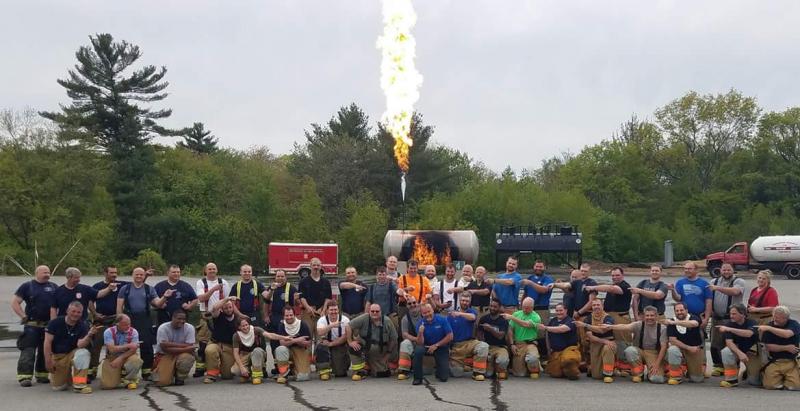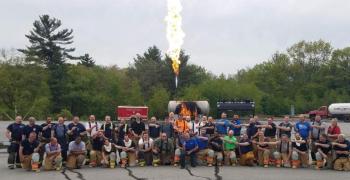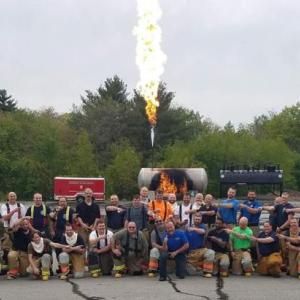Firefighters advance training as propane usage grows
 Students of the three-day course pose for a picture at the Fire Academy in Stow, Massachusetts. (Photo courtesy of the Propane Gas Association of New England)
Students of the three-day course pose for a picture at the Fire Academy in Stow, Massachusetts. (Photo courtesy of the Propane Gas Association of New England)
 Students of the three-day course pose for a picture at the Fire Academy in Stow, Massachusetts. (Photo courtesy of the Propane Gas Association of New England)
Students of the three-day course pose for a picture at the Fire Academy in Stow, Massachusetts. (Photo courtesy of the Propane Gas Association of New England)
ROCKLAND – Unlike most states, Maine homeowners have the right to work on their own gas equipment, according to Scott Robertson, advisor for Maritime Energy. Robertson has trouble wrapping his brain around this rare allowance.
Though in Maine, “most of them [homeowners] are smart enough not to,” he said, recent propane-related news stories have strengthened his company’s resolve to help advance propane-related training for local responders. (See recent coverage of the Waldoboro house explosion)
In May, Maritime Energy covered the expenses for four firefighters to attend the two full days of classroom training and a third day of hands-on leak checks and extinguishing of ignited propane. At the same time, the Propane Educational and Research Council weekend provided networking, strengthening the resources of the communities involved.
In return, the company asked that the foursome return home and share their education with others in the firefighting community.
Firefighters David Elwell and Arthur Hutchinson of the South Thomaston department joined Rodney Gibbs of Rockland and Brian Sullivan of Rockland and Appleton at the Massachusetts Fire Academy.
The Academy, according to Robertson, ignites actual cutaways of delivery trucks, tractor trailers, and private property fuel tanks. “I’d go back in a heartbeat,” Sullivan said before reiterating that he’d want his coworkers to have the opportunity as well.
Though Sullivan estimated the class demographic to be about 75 percent propane company technicians and 25 percent firefighters, the elite facility produced beneficial resources and networking for mitigating potential gas-related situations.
“Propane is growing in the state of Maine,” said Maritime Energy President Susan Ware Page.
The gas is considered a green fuel, and is listed within the Clean Air Act.
Maritime Energy holds the propane contracts for the new Owls Head Community School and the new Midcoast School of Technology, according to Page. The company has also converted many RSU 13 and Camden schools to the gas.
“It’s important that our customers can feel very safe and worry-free because of the strict policies that we have in place when it comes to propane,” she said. “We figure, the more information and training that firefighters can get – the more knowledge the better.”
Though major propane-related incidences are rare, Robertson said, “It’s safe until it’s not.”
His advice: Only allow well-trained, well-licensed technicians to work on the equipment.
Sullivan said, “The potential is always there.”
His advice: Follow the manufacturer’s instructions.
One example Sullivan remembered from the class was of a homeowner who backed a Bobcat machine into the riser of a 1,000-ft underground tank, bending and cracking the riser at the base. To resolve the problem, a company developed an inverted bell-shaped structure with a screw to envelope and seal the tank.
No one was injured in that case. However, in Ghent, West Virginia in 2007, two emergency responders and two propane technicians died, and four others were injured after a series of errors led to an explosion. Gas being transferred from an improperly located gas tank entered an adjacent convenience store. The convenience store had not been evacuated. The gas ignited, leveling the store, according to the U.S. Chemical Safety and Hazard Investigation Board.
Though Page stated that Maritime Energy is not associated with any of the local, publicized incidences, the company feels strongly about keeping customers, employees, and responders safe.
“That’s why we wanted to offer this to our local fire departments,” she said. “We thought that if everything went well, and they gained a lot of knowledge from it, then we can look to next year to sponsor firefighters from other towns and continue this.”
Reach Sarah Thompson at news@penbaypilot.com
Event Date
Address
United States
























